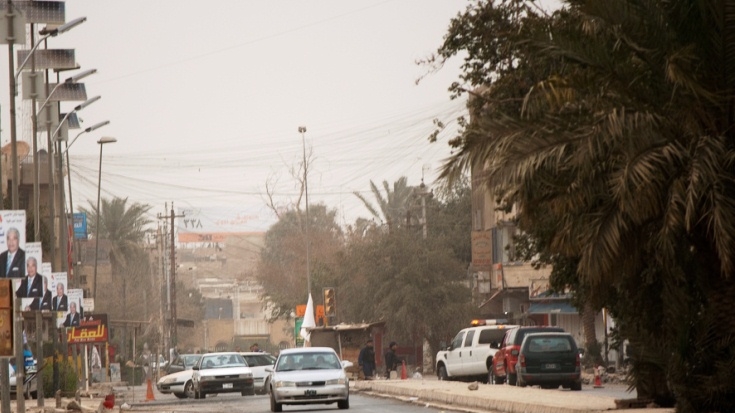Iraq’s economic prospects are highly dependent on the appropriate development of its energy sector, with 98% of total exports and 96% of budget revenues flowing from the sector. However in 2009, oil production remained below pre-war levels, gas was being flared in significant and increasing volumes and a lack of domestic energy supply was restricting economic growth - with unmet electricity demand meaning most Iraqis had less than 8 hours of power every day, and costing the Iraqi economy around US$40 billion yearly. Iraq was struggling to re-build its weakened energy sector institutions, environmental and social concerns were largely ignored, and corruption and lack of transparency plagued the sector.
Solution
Iraq's Integrated National Energy Strategy, which was developed through the support of the World Bank managed Iraq Trust Fund, is the result of the closely coordinated efforts of a number of significant Iraqi ministries: Oil, Electricity, Finance, Planning, Water, Environment, and Industry and Minerals.
The World Bank provided grant funding to hire an international consultant to support the Government of Iraq in the development of its national energy strategy and also provided a team of World Bank specialists who provided critical advice and comments at key points in the strategy's development, and worked closely with the Iraq Prime Minister's Advisory Commission to ensure that the strategy was developed through a strong consultative process, with input from stakeholder Ministries, the Iraqi parliament, civil society and academia.
Results
The Integrated National Energy Strategy (INES) goes beyond Iraq's short-term focus of maximizing oil export and revenues, and through a strategy that also develops its gas sector, power sector, and value adding industries, seeks to diversify Iraq's economy, and create almost 10 million new jobs in the economy by 2030. The strategy will guide US$600 billion in investments in the energy sector, and related ‘value adding’ sectors such as petrochemicals, fertilizers, steel, and aluminum production. It will also reform and strengthen Iraq’s energy sector institutions and significantly increase private sector participation and investment in Iraq’s energy sector and related industry. Iraq’s focus on revenue maximization from its energy sector is now also balanced by a drive towards economic diversification, environmental and social sustainability, energy security and jobs growth.
Bank Group Contribution
The Technical Assistance (TA) was funded by the Iraq Trust Fund for a total envelope of US$6.9 million which included an additional financing component of US$1.9 million.
A team of World Bank specialists provided critical advice and comment at key points in the strategy's development, and worked closely with the Iraq Prime Minister's Advisory Commission to ensure that the strategy was developed through a strong consultative process, with input from stakeholder Ministries, the Iraqi parliament, civil society and academia.
Partners
Aside from the donors that contributed to the Iraq Trust Fund (ITF) this was a TA prepared by the World Bank and the Iraqi Government. The ITF Donors included the following: Australia, Belgium, Canada, Denmark, European Commission, Finland, Germany, Greece, Iceland, India, Ireland, Italy, Japan, Korea, Kuwait, Luxembourg, Netherlands, New Zealand, Norway, Qatar, Spain, Sweden, Turkey, United Kingdom and The United States.
Moving Forward
The strong ownership developed across the Government in the strategy means that implementation is now well underway, even though the strategy was only completed last year. Oil infrastructure continues to be strengthened and expanded; significant investments are being planned to reduce gas flaring and ensure that gas is made available to downstream industries, and replaces heavy fuel oil and diesel as the fuel for power generation; and agreements are already being struck with private companies to invest in energy-related industries that hold the key to jobs growth in the Iraqi economy.
As a result of the strong relationships forged through the development of Iraq's Integrated National Energy Strategy, the Bank is continuing to expand its support for Iraq's energy sector. The Bank is now in dialogue with the Government on TA, Reimbursable Advisory Services (RAS) or prospective operations in gas sector reform, electricity loss reduction and distribution sector reform, renewable energy developments, and energy efficiency. The Bank’s program has become much more comprehensive and strategic since the INES was developed and we look forward to continuing to grow our engagement in support of Iraq’s most significant economic sector.
Beneficiaries
The ultimate beneficiaries of the INES and its recommendations are Iraqi citizens through improved service delivery, job creation and poverty reduction and the private sector through economic diversification, investment opportunities and energy sector service delivery. As the Government noted on the issue of INES, “because multiple institutions must work together to accomplish the goals of the INES…through the effective management of large numbers of complex interconnected tasks, the strategy recognizes this dual need for economic and institutional direction in both areas”.
